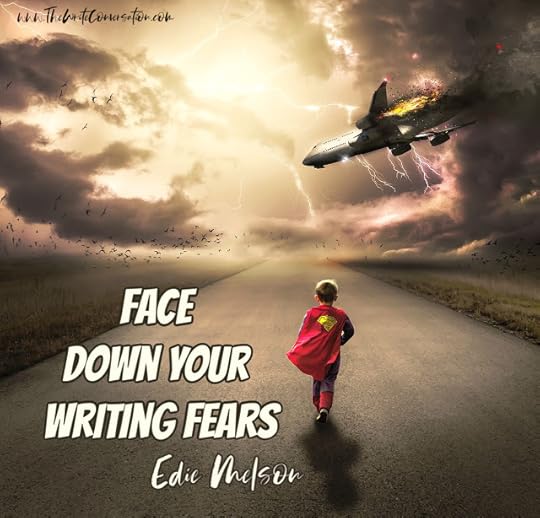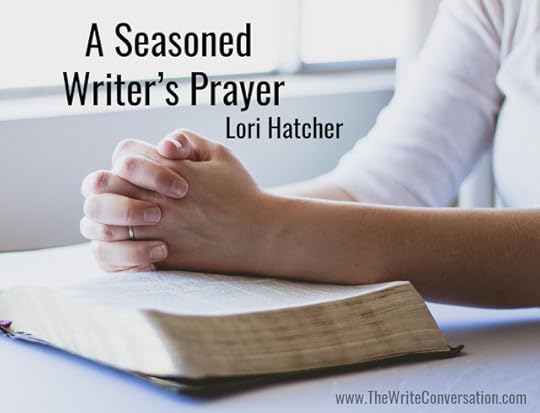Edie Melson's Blog, page 221
October 31, 2019
Do’s and Don’ts for Writing Dialogue

by Kathleen Neely @NeelyKneely3628
Dialogue is as crucial to a novel as conversation at the dinner table. Without it, both are lifeless. However, conversation comes much easier than well-written dialogue. My tips are far from an exhaustive list and tend to be ambiguous. That’s because the rules aren’t hard and fast.
On those occasions where a dialogue tag works best, avoid being creative. The simple He said is probably better than he uttered, he declared, he stated. They sound unnatural. Actually, they sound like you searched for a word to replace said. If you keep those tags to a minimum, said works just fine.
Avoid adverbs to enhance your tags. He asked inquisitively. She answered snidely. If there’s a need to elaborate, make sure it’s not redundant and don’t add it to a tag. It draws unwanted attention to something that editors and publishers may see as a negative. Try elaborating with body language.
Dialogue to advance plot:When characters talk, it should always be a means to advance your story. It’s powerful when used in conflict. Frankly, those scenes aren’t difficult to write. They can hardly wait to jump from your head to your paper. But even non-conflictual conversation should move the storyline. We can use it to show growing relationships between friends and lovers, deep-seeded jealousy or admiration. It may have a touch of humor or a covert cynicism. Those conversations build characters, and well-developed characters advance your plot.
Character Voice: Now let’s talk about voice. Not your voice as a writer, but your character’s voice. One of the hard, fast early rules that writers learn is ‘show, don’t tell’. We do that in a myriad of ways, but dialogue is a great tool to assist in that task. It allows readers to know the character on a deeper level. The following passage from The Least of These includes dialogue from Stella, spoken to Scott.
“Scott. Look at me.” She touched my hands to move them from my face. “Look at me. You were fifteen years old. You were a child—a child placed in a terrible situation. You’d lost the intimacy with your brother, the only person you’d ever had a relationship with. You had a domineering father and an absent mother. Don’t carry this burden of guilt. It’s not yours. Put it where it belongs. Your brother made bad choices. Your parents didn’t parent well. A fifteen-year-old kid can’t be expected to handle the gravity of that situation.”
If you didn’t know Stella before, this passage would give you a glimpse of her wisdom and compassion.
Dialect is another element of character voice. Writing dialect is not for the faint of heart. It’s tough. I’ve done it a few times. The more you do it, the easier it becomes. The following passage from The Street Singer is an example of character voice in dialect.
“Well, Miz Tizzie sent me away, said she couldn’t have no sprite of a girl singing with a big old baby showing ready to come.” Adda held onto the envelope and continued. “That ended my singing for money. When my birthing time started, Mama and another sharecropper’s wife who done some midwifing were there. She sent everyone else away, which weren’t too many, ’cause by now, just me, Minny, and Rosa lived at home.
“The midwife lady told Mama I’d be having trouble cause of being so little. We didn’t have no doctoring money, so they done the best they could. My little one took a long time coming. It took two days, and I know Mama thought I was gonna see my reward in heaven, but then he came. He was so tiny and curled his little fists up tight. When they laid him in my arms, he cradled against me just purring like a barn kitten.”
I chose this passage because it has two elements I hoped to share. The first and obvious, is the use of dialect. But did you notice how you can weave backstory into your dialogue? It’s less laborious than those dry passages of information you need to somehow communicate to your readers.
When you finish a passage, always read it aloud. Does it sound authentic? Is the speech natural? Reading aloud enables you to catch problems.
These are just a few thoughts. If you have tips for writing dialogue, I’d love to hear from you.
TWEETABLE
Do’s and Don’ts for Writing Dialogue - @NeelyKneely3628 on @EdieMelson (Click to Tweet)
Kathleen Neely has been a teacher, a principal, and an award-winning author. She currently has three novels available through Harbourlight, an imprint of Pelican Book Group, and numerous devotions on ChristianDevotions.us. She is a member of Association of Christian Fiction Writers. She and her husband reside in South Carolina. When she’s not writing, she travels frequently to Pennsylvania, Florida, and any Carolina beach to spend time with family. You can connect with her on her website at www.KathleenNeely.com.
Published on October 31, 2019 22:00
October 30, 2019
Face Down Your Writing Fears

The other day I was talking to a friend of mine and this person confided that she was afraid she didn’t have what it takes to be a writer. “I’m just not good enough to get a book published, and I don’t know if I ever will be.”
“Welcome to the club,” I told her.
So what’s a writer to do?
Tips to Keep Help You Face Your Writing Fears1. Write Regularly. For some of us that means daily. For others it means on the weekend, or three days a week. The truth is, mood is a fickle mistress and time is NEVER lying around waiting to be found!
2. Choose to Ignore the Negative Voices in Your Head. We all have them—those irritating whispers that tell us we’re not good enough, and we’re selfish to even try to follow our dreams. We can write anyway, or we can cave in to our insecurities. Published writers keep writing, no matter what those voices say. 3. Write Outside Your Comfort Zone. The publishing industry is in a constant state of change. What you write today, may not be popular five years from now. As a writer, you’ll have to constantly be changing and growing. Get used to it now and avoid the deer-in-the-headlights reaction when change comes your way.
4. Find a Writing Tribe. This is a tough enough business without trying to fly solo. We all need fellow writers who understand what we’re doing. These fellow travelers will keep us accountable and encourage us when we think we can’t go any further.
5. Write When You Don’t Have the Time. So often I hear people who want to be published talk about how they’ll start when they find the time. The truth is that time is NEVER lying around waiting to be found. Following our dreams takes sacrifice. We must be willing to make the hard choices and carve out time to write.
6. Stay Active in the Industry. Join writing groups—locally and online. Give back to the writing community at large by volunteering to help others. Trust me when I tell you that no matter where you are in your writing journey, there are those less experienced. And by staying active, it’s harder to quit. The times I’ve wanted to throw in the towel it was having to answer to others that kept me going.
7. Write When You’re NOT Inspired. We cannot wait for the mood strike to write. Inspiration is a fickle mistress. If we’re serious about pursuing publishing dreams, we must move beyond depending on our mood to be able to write.
8. Remind Yourself Why You Write. For me, written words are the way I process life. I don’t talk things out, I write things out. God designed me to be like this. Writing is His gift to me. I have those words taped above my desk so I’ll never forget.
9. Write Through the Fear. Being a published writer goes hand in hand with fear. We’re afraid we won’t be good enough to be published, then that no one will read the book, and finally that we won’t be able to write another book.
These tips help me face my writing fears head on. What would you add to the list? Be sure to share your thoughts in the comments section below.
Don’t forget to join the conversation!Blessings,Edie
TWEETABLES
Face Down Your #Writing Fears These 9 Tips – @EdieMelson (Click to Tweet)
 Edie Melson is a woman of faith with ink-stained fingers observing life through the lens of her camera. No matter whether she’s talking to writers, entrepreneurs, or readers, her first advice is always “Find your voice, live your story.” As an author, blogger, and speaker she’s encouraged and challenged audiences across the country and around the world. Her numerous books reflect her passion to help others develop the strength of their God-given gifts and apply them to their lives. Connect with her on her website, through Facebook, Twitter and Instagram.
Edie Melson is a woman of faith with ink-stained fingers observing life through the lens of her camera. No matter whether she’s talking to writers, entrepreneurs, or readers, her first advice is always “Find your voice, live your story.” As an author, blogger, and speaker she’s encouraged and challenged audiences across the country and around the world. Her numerous books reflect her passion to help others develop the strength of their God-given gifts and apply them to their lives. Connect with her on her website, through Facebook, Twitter and Instagram.
Published on October 30, 2019 22:00
October 29, 2019
9 Blogging Tips From My Canine Friends

by Edie Melson @EdieMelson
Most of you know I’m an animal lover. We have one cat, Emily Dickinson, and our son's dog, Cosmo. I don’t know what I’d do without my four-legged friends cheering me on as I work every day.
But they’re more than just great companions, they’ve got a lot to teach me. I’ve shared lessons from Emily before in a devotion on Being Still. So today I’d like to pass along some of the wisdom I’ve gleaned from my dogs.9 Blogging Tips From My Dogs1. Go all in.When you play, play. When you work, work. And when you rest, rest. My dogs are one hundred percent involved in whatever they’re doing. Beyond that, I’ve discovered that there’s no such thing as a multi-tasking dog. The same should be true for bloggers. Focus on the task at hand by setting aside time to blog. Don’t think of it as work you do in the spaces.
2. Chasing squirrels never ends well. It may be fun, but it rarely bring value to what you’re doing. When our boys were young (and so was Jake) they had the great idea of tying his leash to the handlebars of a scooter so he could pull them down the street. It went well until a squirrel darted in front of Jake. He took off one direction, the son on the scooter went another way. There was definitely collateral damage although none of it permanent. The same thing can with blogging. Leave the squirrel chasing for play time and stay focused on where you’re going in your post and avoid the collateral damage.
3. Loyalty is everything. My dogs are friendly with almost everyone, but their loyalty is to me. As bloggers, we have to have that same kind of loyalty toward our readers.
4. 50 New smells a day.For a dog, going outside is more than exercise, it’s the ability to gather information about the world around them. As bloggers, we can’t become so immersed in our own corner of the world and especially only our point of view.
5. Keep digging until you have what you need. Both our dogs have favorite toys. But when our son's dog was a puppy, his favorite pastime appeared to be getting his stuck under things. He’s learning though, to not just rely on us to get what he needs. He’s learning how to work and dig until he gets them back. As bloggers we can’t just rely on the information others provide. We have to be willing to learn, grow, and dig out what we need to be the best we can be.
6. Wag more, bark less. When my dog comes up to me, he’s grinning and his tail is wagging. He doesn’t approach me barking and growling. We need to make sure we interact with people online by wagging, not barking. Think before you post and keep it positive, you’ll never regret being nice.
7. Puppy treats make the worst job easier. Both our dogs love treats, but training our puppy is giving us a new appreciation about how valuable they are. Treats are also a good way to get me to finish a job I’m dreading.
8. Be ready for an adventure and travel light. My dogs are always ready to go for an adventure. Don’t be too tied to home base. As bloggers (and writers) we can pick up and go at the drop of a hat.
9. Always on guard.My dogs are always aware of what’s going on around them. They may appear to be sleeping soundly or playing hard, but if someone comes to the door, they are the first to alert. Because blogging is an online activity, we also need to always be alert. We shouldn’t be fearful, but we do need to be smart and stay aware.
These are some of the lessons I’ve learned, what has your pet taught you about blogging, writing or even life? Be sure to share your thoughts in the comments section below.
Don’t forget to join the conversation!Blessings,Edie
TWEETABLES 9 #Blogging Tips From My Canine Friends - @EdieMelson (Click to Tweet)
Published on October 29, 2019 22:00
October 28, 2019
Tips to Creating Effective Blog Post Titles

by Edie Melson @EdieMelson
I spend a lot of time sharing other bloggers’ posts with my social media network. But spend even more time passing over valuable posts because my followers would have no idea what the post was about. So today I want to give you the basics of titling blog posts.
I pay a lot of attention to my blog post titles, and I often spend almost as much time composing them as I do writing an entire post.
They are that important!
Remember, with a compelling title, a browser becomes a reader. Without a compelling title, the rest of your words might as well not be written.
We are writers, and we love words. Even more than that, we love to be clever. I get that.
But a blog post title isn’t a place to just be clever. For example, the title of the blog post you're reading this isn't very clever, but it’s very specific. Originally I thought about titling this post:
What’s That Mean?
That title, (What's that Mean?) is a play on a popular tagline found at the end of many current television shows. But that alone wouldn’t tell a reader what to expect. That’s why I chose a different title:
Keys to Choosing Blog Post Titles that Work
So go ahead, and play with words, but don’t do it in the title. Give your readers and potential readers the information they need!
If you’re still not quite sure what I mean, I’ve compiled a list of ambiguous blog post titles. These are taken from actual posts that I’ve found on the Internet. Take a minute to to figure out what the blog posts might be about before you read the answers below.
The Summer of Success
When Things Go South
In the Mood
I Live Next Door to a Cemetery
Choosing Joy Instead of Jealousy
Hooptedoodle and You
Perseverance Pays off
Three Steps to Prevent Overfiring
Not Quite What I expected
Take a Deep Breath
ANSWERS:The Summer of Success – about what writers can learn from the career of Donna Summer
When Things Go South - the fine line between showing enough of our characters life to immerse the reader and make it realistic without boring them to tears.
In the Mood – writing with determination
I Live Next Door to a Cemetery – odd places to find writing inspiration
Choosing Joy Instead of Jealousy – don’t be jealous over other WRITERS’ successes
Hooptedoodle and You – writing styles and how to pinpoint yours
Perseverance Pays off – becoming a published novelist isn’t the end, but the beginning.
Three Steps to Prevent Overfiring – comparing the warning on a wood stove with writing overload
Not Quite What I expected - If a craft project seems intimidating, don’t let it stop you. Give it a try anyway.
Take a Deep Breath – don’t get overwhelmed with the NaNoWriMo writing marathon
I hope I've illustrated the importance of choosing blog posts titles that don't confuse our readers. I'd love to hear your thoughts on this subject. Be sure to share them in the comments section below.
Don't forget to join the conversation.
Blessings,
Edie
TWEETABLE
Tips to Creating Effective Blog Post Titles - @EdieMelson (Click to Tweet)
 Edie Melson is a woman of faith with ink-stained fingers observing life through the lens of her camera. No matter whether she’s talking to writers, entrepreneurs, or readers, her first advice is always “Find your voice, live your story.” As an author, blogger, and speaker she’s encouraged and challenged audiences across the country and around the world. Her numerous books reflect her passion to help others develop the strength of their God-given gifts and apply them to their lives. Connect with her on her website, through Facebook, Twitter and Instagram.
Edie Melson is a woman of faith with ink-stained fingers observing life through the lens of her camera. No matter whether she’s talking to writers, entrepreneurs, or readers, her first advice is always “Find your voice, live your story.” As an author, blogger, and speaker she’s encouraged and challenged audiences across the country and around the world. Her numerous books reflect her passion to help others develop the strength of their God-given gifts and apply them to their lives. Connect with her on her website, through Facebook, Twitter and Instagram.
Published on October 28, 2019 22:00
October 27, 2019
Why a Writer's Office Needs a Door

by Ane Mulligan @AneMulligan
I have a dream. It's of my optimal office space. I've achieved part of it, but there are some elements missing. Like the mountain lake outside my window. Hey, a girl can dream, right? I'd love a coffee bar behind my desk. I’m want someone to invent a desk that cleans itself. But most of all, I want a door I can close when I'm working.
 I spent the first few years of my writing career working in a corner of our master bedroom. Giant fir trees brushed the second story window, so I could fool myself that I was in the mountains. Even though chaos surrounded me in files and tube, I closed the door and pumped out six or seven books there.
I spent the first few years of my writing career working in a corner of our master bedroom. Giant fir trees brushed the second story window, so I could fool myself that I was in the mountains. Even though chaos surrounded me in files and tube, I closed the door and pumped out six or seven books there.  With the arrival of the first book contract, my office moved to the unused front "parlor." Lest you think I live in a great old Victorian, it is a tiny living room off the foyer. We have a great room, so that became my office. My husband bought me a beautiful, old Queen Anne desk. We finally changed the flooring in the house to all high-end vinyl plank flooring, which I love. Now my chair rolls across it instead of catching in the carpet.
With the arrival of the first book contract, my office moved to the unused front "parlor." Lest you think I live in a great old Victorian, it is a tiny living room off the foyer. We have a great room, so that became my office. My husband bought me a beautiful, old Queen Anne desk. We finally changed the flooring in the house to all high-end vinyl plank flooring, which I love. Now my chair rolls across it instead of catching in the carpet. But there is no door. That means the entire household and the household chores can call my name at any time throughout the day. Insert snarky smile. They gang up on me. The washer swishes, "Ane, the towels are almost done. Time for anther load." The vacuum sucks the air from the room, groaning it needs dust. And then there's my husband. He forgets I'm writing. For some reason screeching, "Don't bother me—I'm in my story world," isn't an option with husbands. Not unless you want your shoe allowance cut off. I've tried saying, "I'm not here. I'm in Chapel Springs." Didn't work. He could hear that I was in the next room.
I’m one who needs silence when I write. I rarely even play music. Hmm, maybe I do need to spend time developing a play list. That might drown out the washing machine and the vacuum. But my biggest need is a door. I'd even give up the mountain lake view for a door. Not too sure about the coffee bar, although I can claim I exercise every day. After all, the Keurig is in the kitchen, which is across the house from my office.
What does your optimal writing space look like? Have you achieved it? Do you have any suggestions for me?
TWEETABLEWhy a Writer's Office Needs a Door - @AneMulligan on @EdieMelson (Click to Tweet)
 Ane Mulligan has been a voracious reader ever since her mom instilled within her a love of reading at age three, escaping into worlds otherwise unknown. But when Ane saw Mary Martin in PETER PAN, she was struck with a fever from which she never recovered—stage fever. She submerged herself in drama through high school and college. Years later, her two loves collided, and a bestselling, award-winning novelist emerged. She resides in Sugar Hill, GA, with her artist husband and a rascally Rottweiler. Find Ane on her website, Amazon Author page, Facebook, Twitter, Instagram, Pinterest and The Write Conversation.
Ane Mulligan has been a voracious reader ever since her mom instilled within her a love of reading at age three, escaping into worlds otherwise unknown. But when Ane saw Mary Martin in PETER PAN, she was struck with a fever from which she never recovered—stage fever. She submerged herself in drama through high school and college. Years later, her two loves collided, and a bestselling, award-winning novelist emerged. She resides in Sugar Hill, GA, with her artist husband and a rascally Rottweiler. Find Ane on her website, Amazon Author page, Facebook, Twitter, Instagram, Pinterest and The Write Conversation.
Published on October 27, 2019 22:00
October 26, 2019
Persona Non Au Gratin

by Rhonda Rhea @RhondaRhea
Do you know how glorious it is to speak at an event that’s directed by a thoughtful and gracious event coordinator? Near-heaven. Chauffeured about, fed the best meals from the finest restaurants, then transported to a posh hotel with a gorgeous gift basket already waiting. Mint-on-the-pillow kind of stuff. Oh how I like being treated like a queen. No one knows better than I do that I don’t deserve it. But I still like it.
I’m suddenly “persona non au gratin”—no longer the big cheese. It’s so funny that I can go straight from the applause of a gracious audience to cleaning the cat box.
While I admit I’ve loved my short reigns as queen, I have to tell you, there’s always been something quite comfortable about coming home to bread-fetching, milk-mopping and cat-box-cleaning servitude. The whole time my kids were growing up it was like I was living with an entire brigade of pride police—and that was not a bad thing.
Humility can be so tricky. Once you realize you have it, it’s probably a point of pride—and then it’s gone. The best way to stay humble is to stay focused on Christ, our example. We’re told in Philippians 2:5-8 to have His attitude. “Let this same attitude and purpose band humble mind be in you which was in Christ Jesus: Let Him be your example in humility. Who, although being essentially one with God and in the form of God, possessing the fullness of the attributes which make God.
God, did not think this equality with God was a thing to be eagerly grasped or retained, But stripped Himself of all privileges and rightful dignity, so as to assume the guise of a servant (slave), in that He became like men and was born a human being. And after He had appeared in human form, He abased and humbled Himself still further and carried His obedience to the extreme of death, even the death of the cross!” (AMP)
Jesus. True royalty, not my faux kind. He is rightly called the King of all kings. Yet this passage tells us that He didn’t hang on to those rights as royalty. He pushed them aside on our behalf and took on servant status. Imagine leaving the splendor of a Heaven, beyond any five-star-plus hotel, to serve and to unselfishly give His life.
I really do want to be like Him. I want to humbly serve before any crowd. And I want to humbly serve as I did when I loaded my shopping cart with four gallons of milk. Also everything in between. The Message phrases Proverbs 15:33b this way: “First you learn humility, then you experience glory.” By His grace, there’s glory before the crowds. I truly believe that in humble surrender, by His grace, there can be glory at the cat box too.
TWEETABLEPersona Non Au Gratin - thoughts on humility from @RhondaRhea on @EdieMelson (Click to Tweet)
 Rhonda Rhea is a humor columnist for lots of great magazines, including HomeLife, Leading Hearts, The Pathway and more. She is the author of 10 nonfiction books, including How Many Lightbulbs Does It Take to Change a Person? and coauthors fiction with her daughter, Kaley Faith Rhea. She and her daughters host the TV show, That’s My Mom, for Christian Television Network’s KNLJ. Rhonda enjoys traveling the country speaking at all kinds of conferences and events. She and her pastor/hubs have five grown children and live in the St. Louis area.
Rhonda Rhea is a humor columnist for lots of great magazines, including HomeLife, Leading Hearts, The Pathway and more. She is the author of 10 nonfiction books, including How Many Lightbulbs Does It Take to Change a Person? and coauthors fiction with her daughter, Kaley Faith Rhea. She and her daughters host the TV show, That’s My Mom, for Christian Television Network’s KNLJ. Rhonda enjoys traveling the country speaking at all kinds of conferences and events. She and her pastor/hubs have five grown children and live in the St. Louis area.
Published on October 26, 2019 22:00
October 25, 2019
Generate More Speaking Opportunities While You're Speaking

by Cathy Fyock @CathyFyock
When you speak, what can you do to generate more speaking assignments?
There are many ways you can generate more speaking engagements while you speak!
During your keynote, workshop, seminar, or webinar, you might include some phrases that let the audience know that you are a speaker and that you regularly provide programs on this and similar topics. While it may seem obvious to you that you would like to do more speaking, the audience may not be aware and are only given this idea when you mention in your presentation that you do other presentations. Do this by including phrases such as the following:When I was in Dallas last week speaking for XYZ organization...In one of my workshops, someone asked me...One of the problems faced by your industry was voiced when I last spoke with...Here’s a great example that was shared as a recent program...
Also, be sure your introduction identifies you as a speaker, and perhaps even mentions some similar audiences for which you’ve spoken. Don’t assume that your audience will know that this is one of your primary revenue streams!
Be sure your introduction identifies you as a speaker, and perhaps even mentions some similar audiences for which you’ve spoken.
In your handouts, include a short bio that identified you as a speaker. Include contact information on each page. Once Cathy attended a program and wanted to follow up with the speaker some months later, but was not able to find the speaker’s contact information (and had forgotten the speaker’s name). If only the speaker had made it easier for the audience members to find her!
Another strategy for being asked back by decision-makers is to ask your audiences what information and programs they need to be successful, what their major pain points are, or what they’d most like to learn in follow-up sessions. Survey your audience members (you can use your response cards or a survey), and then share that information with the decision-makers as a next step. It’s your job to make sure the decision-maker is aware of everything you do.
Activity: What can you do to be more intentional about generating more business when you speak?
TWEETABLEGenerate More Speaking Opportunities While You're #Speaking - @CathyFyock on @EdieMelson #SpeaktoSell #writing
 Cathy Fyock is The Business Book Strategist, and works with professionals and thought leaders who want to write as a business development strategy. She is the author of nine books, including her most recent with coauthor Lois Creamer, The Speaker Author: Sell More Books and Book More Speeches. Since starting her business in 2014 she's helped more than 150 professionals become published authors. You can reach her at Cathy@CathyFyock.com.
Cathy Fyock is The Business Book Strategist, and works with professionals and thought leaders who want to write as a business development strategy. She is the author of nine books, including her most recent with coauthor Lois Creamer, The Speaker Author: Sell More Books and Book More Speeches. Since starting her business in 2014 she's helped more than 150 professionals become published authors. You can reach her at Cathy@CathyFyock.com.
Published on October 25, 2019 22:00
October 24, 2019
A Seasoned Writer’s Prayer

by Lori Hatcher @LoriHatcher2
For who makes you different from anyone else? What do you have that you did not receive? And if you did receive it, why do you boast as though you did not? 1 Corinthians 4:7
Father, thank you for the writing opportunities you’ve given me. Thank you for article ideas, devotional thoughts, and book concepts. Thank you for the joy of writing. Your Word tells me “every good and perfect gift comes from above,” so I know these publishing treasures come from you. You remind me, “[s]he who has been given a trust must prove faithful.” Make me faithful, Lord. Help me not waste a moment, an idea, or an opportunity.
You encourage us not to despise the day of small beginnings, but I confess, Lord, how quickly I forget how inexperienced I was and how far you’ve brought me. Remind me often of my awful prose, awkward professional moments, and breaches of protocol.
Give me a kind and tender heart toward new writers, for I was one not long ago. Help me overlook their mistakes, because I’ve made the same errors—and worse. Help me be quick to instruct instead of swift to criticize. When I teach, help me teach with a spirit of humility.
Lord, you resist the proud but give grace to the humble. Keep me humble. I never want you to resist me. When I’m tempted to look down from my lofty peak of publishing accomplishment, help me see the footprints of those who helped carry me up the trail.
Remind me of the kind mentors who took me under their wing every step of the way. Place in me a similar heart to help those who need guidance and instruction. Help me never think I’m too busy, too important, or too far up the publishing chain to give back to the writing community—and to the individual writers you’ve placed in my life. In the great cloud of witnesses, show me the faces of editors, agents, and publishing houses that took a risk and gave me a chance. Bless ‘em, Lord.
When I’m tempted to pat myself on the back, may the parable of the rich man stop me. Instead of building bigger barns, show me how to give my writing wealth away. Whatever skill, knowledge, leads, connections, or insight you’ve blessed me with, let me share it with abandon. Give me opportunities to “train my competition,” as Vonda Skelton always said. Use me as a channel, not a reservoir.
As John the Baptist said of Jesus and himself, “[You] must increase, and I must decrease.” May this be true in my life, today and every day.
In the strong name of Jesus I pray, Amen.
TWEETABLE
A Seasoned Writer's Prayer - @LoriHatcher2 on @EdieMelson (Click to Tweet)
 Lori Hatcher is the editor of
Reach Out, Columbia
magazine and the author of several devotional books.
Hungry for God … Starving for Time, Five-Minute Devotions for Busy Women
won the 2016 Christian Small Publisher Book of the Year award. Her most recent book, Refresh Your Faith – Uncommon Devotions from Every Book of the Bible is due out in the spring of 2020. A blogger, writing instructor, and inspirational speaker, her goal is to help women connect with God in the craziness of life You’ll find her pondering the marvelous and the mundane on her blog, Hungry for God. . . Starving for Time . Connect with her on Facebook, Twitter (@LoriHatcher2), or Pinterest (Hungry for God).
Lori Hatcher is the editor of
Reach Out, Columbia
magazine and the author of several devotional books.
Hungry for God … Starving for Time, Five-Minute Devotions for Busy Women
won the 2016 Christian Small Publisher Book of the Year award. Her most recent book, Refresh Your Faith – Uncommon Devotions from Every Book of the Bible is due out in the spring of 2020. A blogger, writing instructor, and inspirational speaker, her goal is to help women connect with God in the craziness of life You’ll find her pondering the marvelous and the mundane on her blog, Hungry for God. . . Starving for Time . Connect with her on Facebook, Twitter (@LoriHatcher2), or Pinterest (Hungry for God).
Published on October 24, 2019 22:00
October 23, 2019
What Legacy Are We Leaving?

by Henry McLaughlin @RiverBendSagas
Often when we think of legacy, it’s in terms of what are we leaving behind us materially. We can’t take it with us. We never see a hearse followed by an armored car filled with gold.We wonder are we leaving enough to support our families. Or are we burdening them with debt and obligations?
This is part of our legacy. We need to provide for and protect our loved ones. But our legacy is so much more than that.
We’re also leaving behind people. How will be remembered by others? How have we helped them be the best people they can be? This doesn’t just apply to our children, although they are our greatest responsibility in this area. An excellent book on this is Heritage: A Father’s Influence to the Generations by Tom Lane. I highly recommend it.
But there are others we’ve influenced. Neighbors, co-workers, employees, employers. If we serve in our church in any capacity, we have the opportunity to influence, for good or ill, those we come in contact with.
We establish a legacy by what we say and do. Do we profess to be Christian, but flip off a driver who irritates us? Or do we irritate other drivers? Do we work on a project team, but tell the boss we did most of the work? If we own a business, do we pay our employees a livable wage? How do we treat our customers? Do we stand behind our product?
Before we moved to Texas, I shopped at the same stores my father had, and used the same auto mechanic. Why? Because I watched my Dad and discovered he patronized those businesses because he trusted them. Because he trusted them, I trusted them. Those businesses created a legacy that passed from generation to generation.
If we serve in church, do we do it to help others? Or are we sometimes motivated by the need to be noticed and promoted? I was like this, serving but looking to use it for promotion. I wanted people to notice me.
Now, I still serve in church, but I’ve learned to do it as a servant. Is there a need I can fill? If God says, “Yes,” I do it. I no longer do it to be noticed or promoted. Recently, I’ve been asked to take on a leadership role. After praying and consulting with my wife, I turned it down. Not because I wasn’t capable, but because God has taught me humility and to follow his direction.
He’s teaching me my legacy is to follow him and give him the glory and the credit. My legacy is mentoring, teaching, and guiding those he brings across my path whether it’s in writing or church. My legacy is to support, encourage, and help without seeking credit or promotion.
This has been a significant paradigm shift for me. One-hundred-eighty degrees. God has changed my focus from, “Look at all I can do,” to “how can I help others find their place in God,” whether it be in their writing careers, in their personal finances, in their relationships.
This has been very humbling for me and it is still very much a work in process. I’m not leaving just a material legacy. I want to leave a legacy of inspiring others to serve and to find their calling and their place in God’s plan.
What kind of legacy do you think you’re leaving?
TWEETABLE
What Legacy Are We Leaving - Henry McLaughlin, @RiverBendSagas on @EdieMelson (Click to Tweet)
 Henry’s debut novel, Journey to Riverbend, won the 2009 Operation First Novel contest.
Henry’s debut novel, Journey to Riverbend, won the 2009 Operation First Novel contest.Henry edits novels, leads critique groups, and teaches at conferences and workshops. He enjoys mentoring and coaching individual writers.
Connect with Henry on his blog, Twitter and Facebook.
Published on October 23, 2019 22:00
October 22, 2019
7 Tips to Take the Boo out of Writing

by DiAnn Mills @DiAnnMills
Do you feel like it’s Halloween every time you start a writing project? How would you like to take the boo out of those scary feelings? The following are seven ways to overcome the fear and write on!Practice self-talk. I am a great writer. Experts say our internal dialogue reveals who we believe we are. So write the phrase on sticky pads all over the house, whisper this affirmation to yourself, and if you use lipstick, write it on your bathroom mirror. Reminders are the perfect way to keep us on task.Pray before we place our fingers on the keyboard. Our inspiration and creativity comes from outside ourselves. This applies to all we do.Prepare our writing space to rid the area of distractions. That means a do-not-disturb sign on the door of our office. It also means turning off our message apps and email notices. And we can’t forget to silence our phones.Plan what we are to write. Our method of writing has no bearing on our method of creating. Without a plan—pantster or plotter, fiction or nonfiction—we have to know where we’re going before we can get started.Proceed with enthusiasm. This is our time to shine! We love what we do, and it’s a gift not many possess but wish they could weave words to create something beautiful.Penetrate our subconscious with specific words or phrases that show originality, research, and a labor of love.Passion for our projects means we are transparent in our communication
These are my Seven Ps to chase away the boos of writing. What is a tip you can share?
TWEETABLE
7 Tips to Take the Boo out of #Writing - @DiAnnMills on @EdieMelson (Click to Tweet)
 DiAnn Mills is a bestselling author who believes her readers should expect an adventure. She creates action-packed, suspense-filled novels to thrill readers. Her titles have appeared on the CBA and ECPA bestseller lists; won two Christy Awards; and been finalists for the RITA, Daphne Du Maurier, Inspirational Readers’ Choice, and Carol award contests.
DiAnn Mills is a bestselling author who believes her readers should expect an adventure. She creates action-packed, suspense-filled novels to thrill readers. Her titles have appeared on the CBA and ECPA bestseller lists; won two Christy Awards; and been finalists for the RITA, Daphne Du Maurier, Inspirational Readers’ Choice, and Carol award contests. She is the director of the Blue Ridge Mountain Christian Writers Conference, Mountainside Marketing Retreat, and Mountainside Novelist Retreat with social media specialist Edie Melson. Connect here: DiAnnMills.com
Published on October 22, 2019 22:00



